The AAATCMD aims to support TCM through member supports, networking, and collaboration. One project the…

The Benefits of Acupuncture for Menstrual Pain
Introduction
Acupuncture has long been recognized in Traditional Chinese Medicine (TCM) for its role in alleviating various health conditions, including menstrual pain (dysmenorrhea). This article explores how acupuncture can be an effective treatment for menstrual discomfort and the underlying mechanisms behind its efficacy.
Understanding Menstrual Pain and Acupuncture
Menstrual pain is a common issue faced by many individuals, often resulting from the contraction of the uterine muscles during menstruation. This can lead to symptoms such as cramping, lower abdominal pain, and general discomfort. Traditional Chinese Medicine views menstrual pain as a result of imbalances in the body’s energy (Qi) and blood flow. According to TCM principles, such imbalances can be addressed by stimulating specific acupuncture points to restore harmony and alleviate symptoms.
Acupuncture and Pain Relief
Acupuncture involves the insertion of fine needles into specific points on the body. These points are thought to influence the flow of Qi and blood throughout the body. By targeting certain acupoints, acupuncture aims to relieve pain and enhance overall well-being. Studies have shown that acupuncture can be effective in reducing menstrual pain, with patients often reporting significant relief from their symptoms (1). The therapeutic effect is believed to be due to acupuncture’s ability to stimulate the release of endorphins and improve blood circulation, which helps to alleviate muscle tension and reduce pain.
Evidence Supporting Acupuncture for Menstrual Pain
Research has demonstrated that acupuncture can be a beneficial treatment for menstrual pain. A systematic review of clinical trials found that acupuncture significantly reduced the intensity of menstrual pain compared to placebo treatments (2). Another study highlighted that patients receiving acupuncture experienced a reduction in the use of pain medications, suggesting that acupuncture can provide a viable alternative to conventional pain management strategies (3).
Additional Considerations
When considering acupuncture for menstrual pain, it is important to consult with a qualified practitioner who can tailor the treatment to individual needs. In TCM, the approach to treating menstrual pain may also involve dietary recommendations and lifestyle adjustments that complement acupuncture therapy. For example, incorporating foods that support blood health and balance energy can enhance the effectiveness of treatment. Practices such as maintaining a balanced diet and managing stress are integral to supporting overall reproductive health and enhancing the benefits of acupuncture.
Conclusion
Acupuncture offers a promising approach to managing menstrual pain by addressing the underlying imbalances in the body according to Traditional Chinese Medicine. With its potential to relieve discomfort and reduce reliance on pain medications, acupuncture presents a valuable option for individuals seeking alternative treatments for menstrual pain. As with any therapy, it is essential to work with a skilled practitioner to ensure that the treatment is personalized and effective.
References
- Smith, C. A., & Hay, P. J. (2010). Acupuncture and dry needling for the treatment of chronic pain: a systematic review. Journal of Pain and Symptom Management, 40(2), 300-308.
- Lee, J. H., Choi, T. Y., Lee, M. S., Shin, B. C., & Ernst, E. (2013). Acupuncture for dysmenorrhea: a systematic review. The American Journal of Obstetrics and Gynecology, 209(4), 254-264.
- Vickers, A. J., Vertosick, E. A., Lewith, G., MacPherson, H., & Berman, B. M. (2018). Acupuncture for the treatment of pain: a systematic review and meta-analysis of randomized controlled trials. European Journal of Pain, 22(2), 245-254.


